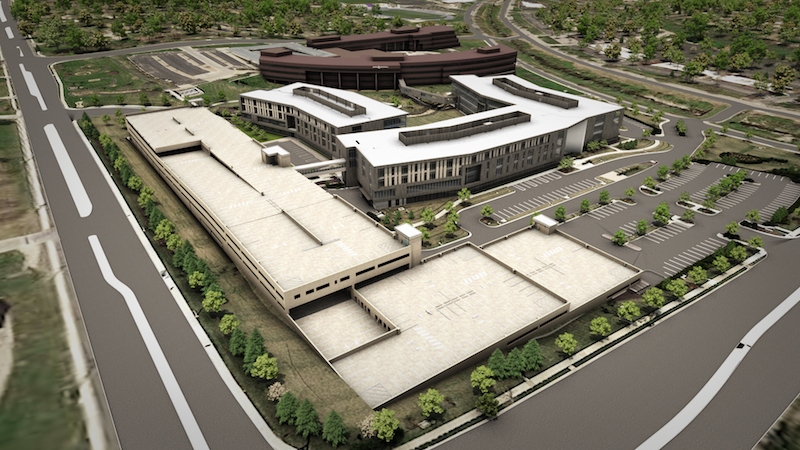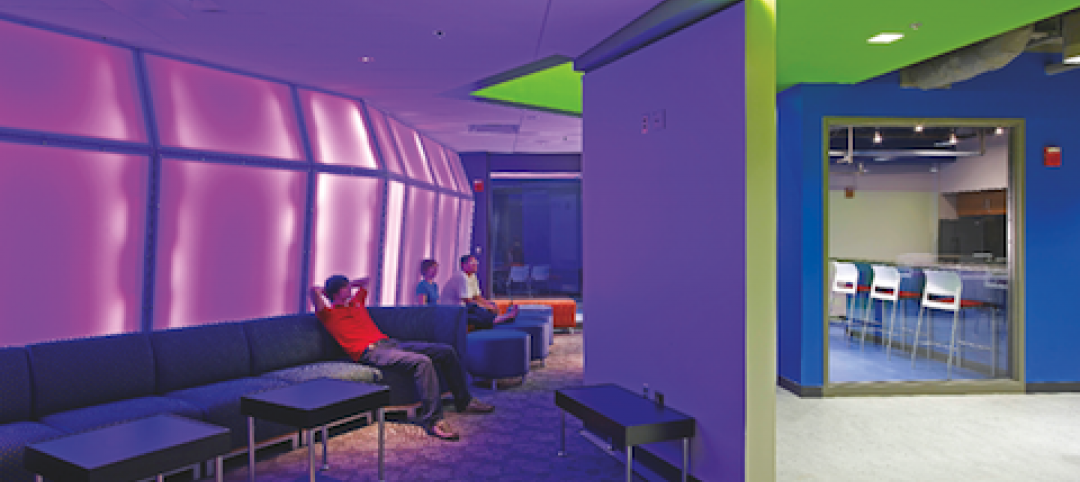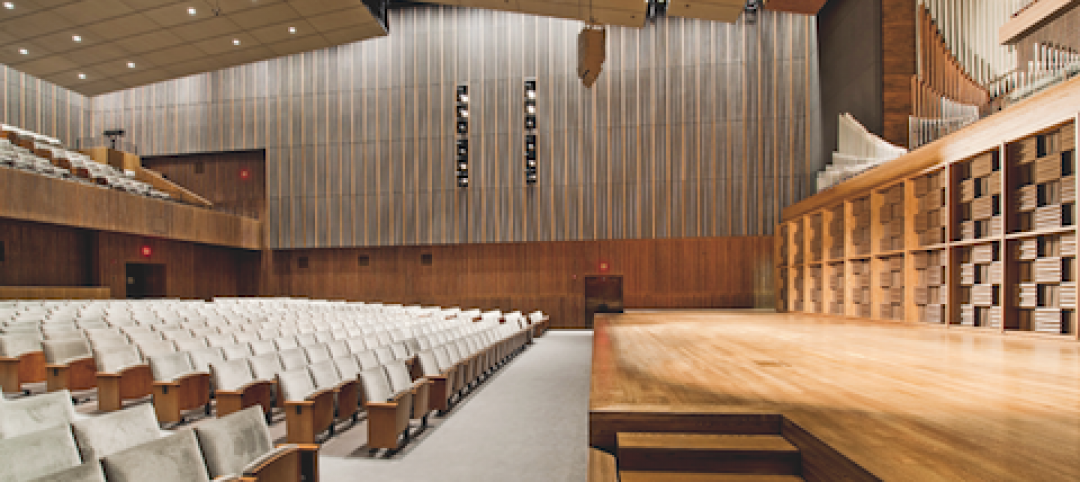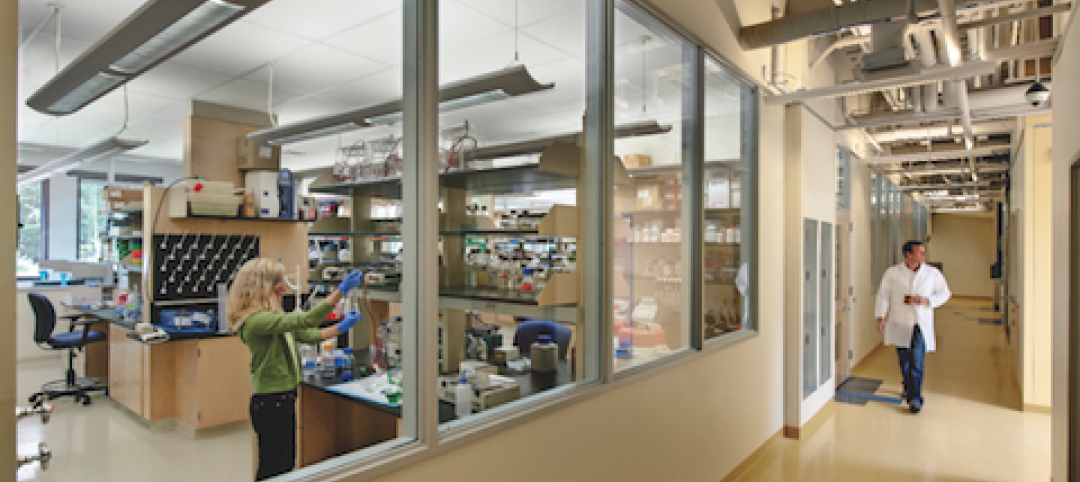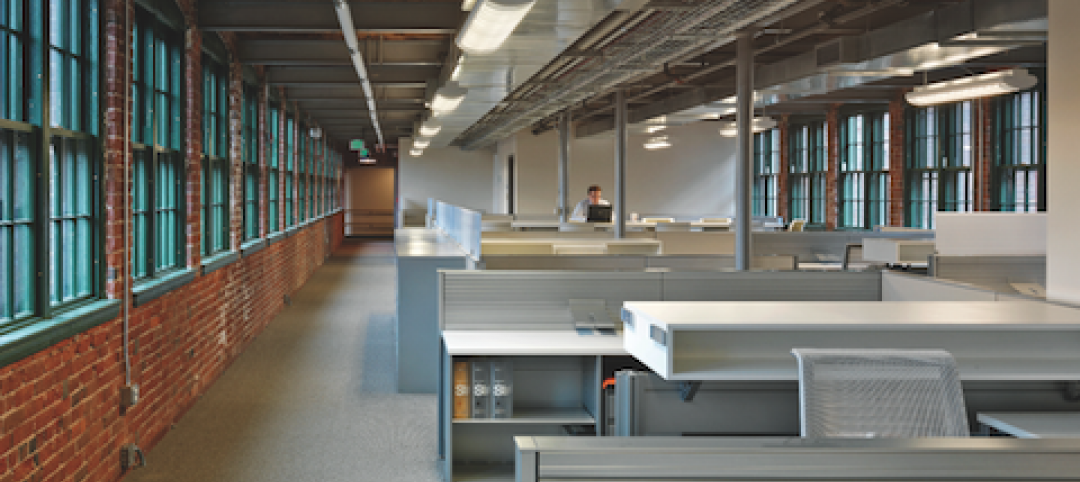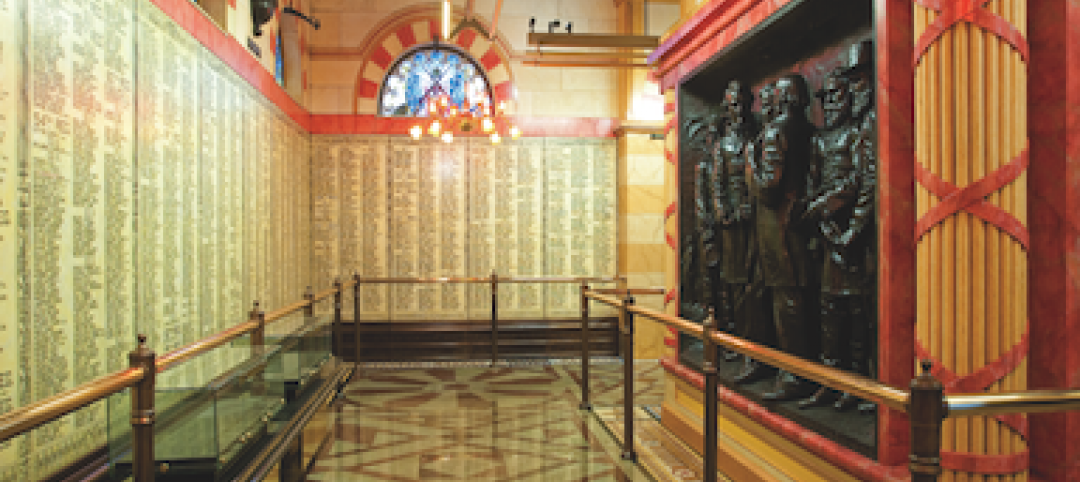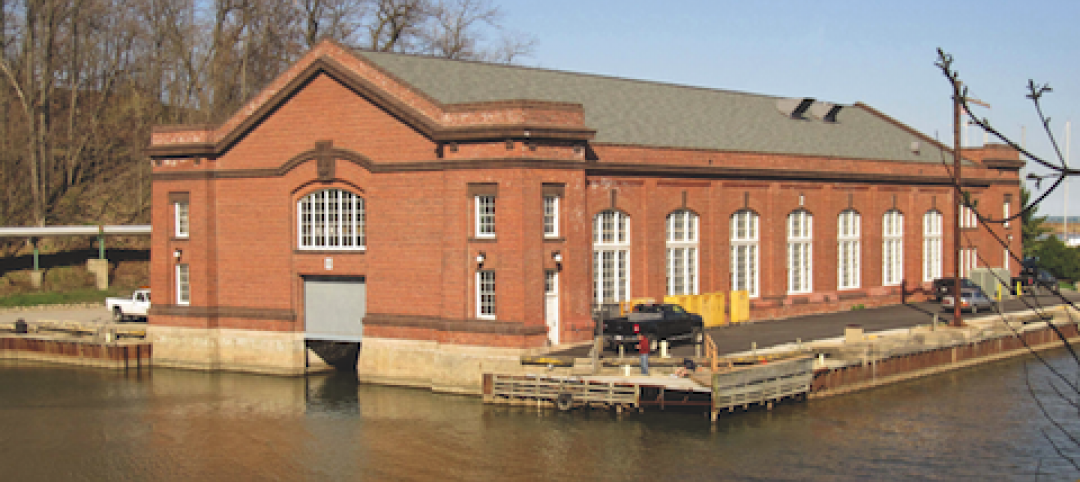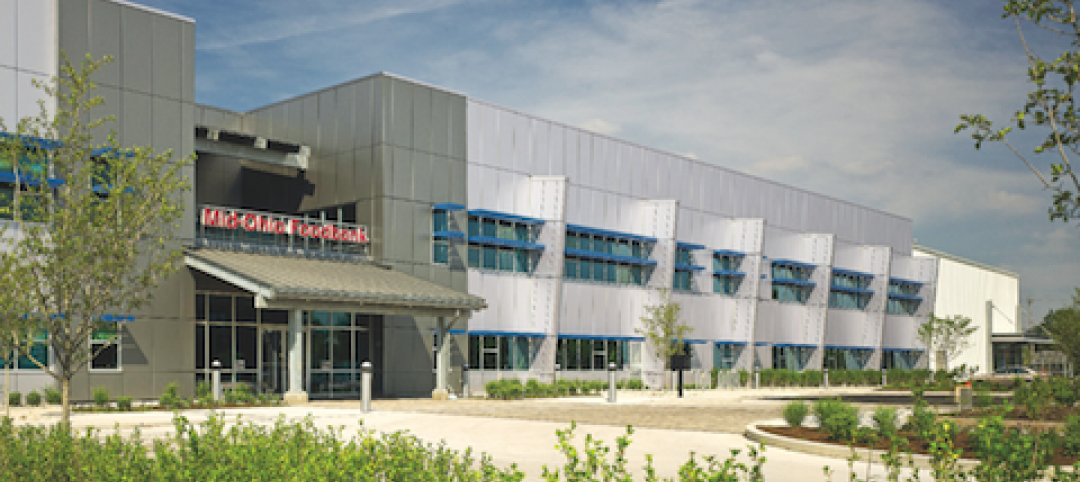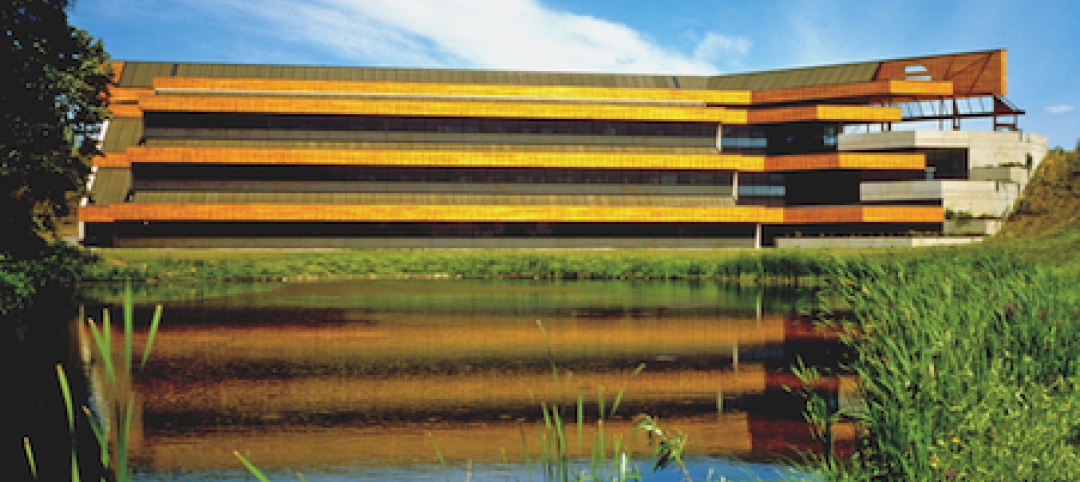Burns & McDonnell, which ranked third among Engineering/Architecture firms on BD+C’s 2018 Giants list, is launching an ambitious growth campaign that includes hiring at least 1,000 employees annually “for the foreseeable future,” and increasing the size of its World Headquarters in Kansas City, Mo., by 22%.
By year’s end, Burns & McDonnell expects to have 6,650 employees, more than half of whom will be working outside of Kansas City. The company has 11 regional offices in North America, and seven offices scattered across Europe, Africa, Asia, and the Middle East.
A 142,000-sf addition to its headquarters, which the firm is designing and building, is scheduled for completion by the summer of 2020. The company’s existing four-story 310,000-sf headquarters building opened in 2016 on a 34-acre campus in South Kansas City.
The $42 million new construction project is expected to commence in a week or two, beginning with a 550-slot parking garage, according to Brittany Swartz, a project manager in the firm’s Commercial Architecture group. The headquarters expansion will include 42 conference rooms, two large training rooms, and 780 work spaces.
Burns & McDonnell reported nearly $3 billion in revenue generated in 2017, of which $290.2 million derived from services provided for nonresidential building in several sectors that include commercial, retail, institutional, aviation, military, and manufacturing.
The firm is expanding to provide “full service solutions” for project owners that are seeking greater scheduling and budgeting certainty. Ray Kowalik, a 31-year company veteran who was named its CEO and chairman last year, adds that Burns & McDonnell had been growing and a 10-12% annual clip, which he believes can be boosted to 15%.
He cites four trends that are driving growth:
•A robust economy, favorable corporate tax law changes, and low energy prices, all of which are spurring investments in the U.S., especially in the chemicals market which is one of the firm’s largest sectors;
•The shift toward natural gas and renewable energy production that’s creating opportunities in the transmission, distribution, and generation markets;
•Greater government investment in resilience to secure and modernize aging facilities; and
•Mushrooming airport passenger traffic, and the need to find new ways to alleviate congestion at domestic and foreign terminals.
Burns & McDonnell shouldn’t have too much trouble meeting its hiring goals: it receives about 80,000 resumes per year, and the company has already hired 1,000 people in 2018, as of today’s announcement. It expects its hiring number to top out at 1,400 this year. “We’re a company that a lot of people want to work for,” says Kowalik. (In prior years, the company would typically offer employment to between 300 and 400 people, with 90% of applicants accepting.)
Kowalik says Burns & McDonnell already has a pretty good system in place for assimilating new hires, which includes extensive training and mentoring. (He said the company’s attrition rate is about 5% annually.)
While the power, gas, oil, and chemicals sectors are among the markets driving growth, Kowalik says his company is also expanding its nonresidential building activities, notably in the areas of office and multitenant apartment construction. “We’re extremely busy in Kansas City,” he says, having recently completed a new office building there for Creative Planning, a local wealth-management firm.
Kowalik adds that new tax policy is sparking “multibillion-dollar projects” in the chemicals industry, which are likely to trigger new commercial construction that supports that business. He expects a similar “trickle down” effect from oil and gas.
Historically, Burns & McDonnell has grown organically, “one employee at a time,” says Kowalik. But in recent years it has bolstered its presence on the construction side with acquisitions of two contractors, AZCO Inc. in Wisconsin and Ref-Chem in Texas.
Kowalik says that it’s possible that his company might seek out joint-venture construction partners. But he hedged about future acquisitions. “The minute I say ‘we’re interested,’ we get 20 calls.”
He is concerned, though, about the skilled-labor shortage, and thinks the AEC industry needs to take a more active role in outreach and training.
Related Stories
| Oct 12, 2010
Owen Hall, Michigan State University, East Lansing, Mich.
27th Annual Reconstruction Awards—Silver Award. Officials at Michigan State University’s East Lansing Campus were concerned that Owen Hall, a mid-20th-century residence facility, was no longer attracting much interest from its target audience, graduate and international students.
| Oct 12, 2010
Gartner Auditorium, Cleveland Museum of Art
27th Annual Reconstruction Awards—Silver Award. Gartner Auditorium was originally designed by Marcel Breuer and completed, in 1971, as part of his Education Wing at the Cleveland Museum of Art. Despite that lofty provenance, the Gartner was never a perfect music venue.
| Oct 12, 2010
Cell and Genome Sciences Building, Farmington, Conn.
27th Annual Reconstruction Awards—Silver Award. Administrators at the University of Connecticut Health Center in Farmington didn’t think much of the 1970s building they planned to turn into the school’s Cell and Genome Sciences Building. It’s not that the former toxicology research facility was in such terrible shape, but the 117,800-sf structure had almost no windows and its interior was dark and chopped up.
| Oct 12, 2010
The Watch Factory, Waltham, Mass.
27th Annual Reconstruction Awards — Gold Award. When the Boston Watch Company opened its factory in 1854 on the banks of the Charles River in Waltham, Mass., the area was far enough away from the dust, dirt, and grime of Boston to safely assemble delicate watch parts.
| Oct 12, 2010
Cuyahoga County Soldiers’ and Sailors’ Monument, Cleveland, Ohio
27th Annual Reconstruction Awards—Gold Award. The Cuyahoga County Soldiers’ and Sailors’ Monument was dedicated on the Fourth of July, 1894, to honor the memory of the more than 9,000 Cuyahoga County veterans of the Civil War.
| Oct 12, 2010
Building 13 Naval Station, Great Lakes, Ill.
27th Annual Reconstruction Awards—Gold Award. Designed by Chicago architect Jarvis Hunt and constructed in 1903, Building 13 is one of 39 structures within the Great Lakes Historic District at Naval Station Great Lakes, Ill.
| Oct 12, 2010
Full Steam Ahead for Sustainable Power Plant
An innovative restoration turns a historic but inoperable coal-burning steam plant into a modern, energy-efficient marvel at Duke University.
| Oct 12, 2010
From ‘Plain Box’ to Community Asset
The Mid-Ohio Foodbank helps provide 55,000 meals a day to the hungry. Who would guess that it was once a nondescript mattress factory?
| Oct 11, 2010
HGA wins 25-Year Award from AIA Minnesota
HGA Architects and Engineers won a 25-Year Award from AIA Minnesota for the Willow Lake Laboratory.
| Oct 11, 2010
MBMA Releases Fire Resistance Design Guide for metal building systems
The Metal Building Manufacturers Association (MBMA) announces the release of the 2010 Fire Resistance Design Guide for Metal Building Systems. The guide provides building owners, architects, engineers, specifiers, fire marshals, building code officials, contractors, product vendors, builders and metal building manufacturers information on how to effectively meet fire resistance requirements of a project with metal building systems.


